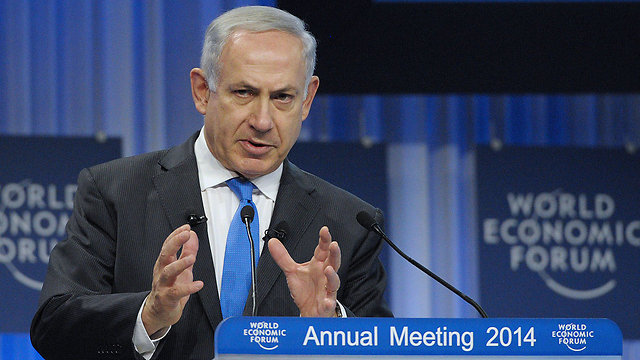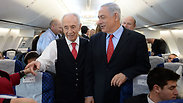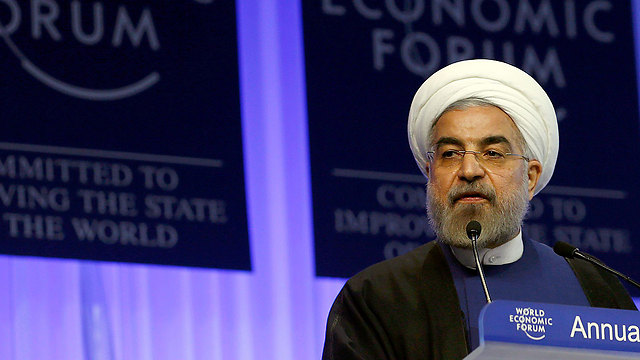Netanyahu at Davos: It takes three to tango for Mideast peace
Israeli PM takes stage at Davos short time after Iran's Rohani. In speech, Netanyahu calls Israel 'innovation nation' and draws direct line between peace and Iran, saying Arab nations more concerned with nuclear Iran than Israel, 'removal of Iranian threat would help peace'
Prime Minister Benjamin Netanyahu delivered an address at the annual economic forum in Davos on Thursday, focusing mainly on economic partnerships and Israel's entrepreneurial opportunities, but also taking questions on the peace process and Iran.
Following his address, the prime minister was asked about Israel's talks with the Palestinians and said that he was "ready for a real, genuine, secure peace," adding that he hoped Palestinian President Mahmoud "Abbas is too, because if he is, I'm sure our American friends will only help."
Related stories:
- Rohani in Davos: Key for Mideast peace is economic growth
- Netanyahu to talk strictly economics at Davos conference
- Israel's economy can’t grow without peace
“I believe we can get there. It is difficult, but it is like riding a bicycle...you have to keep going. In order to make peace in the world, it takes two to tango, and the Middle East needs at least three,” Netanyahu said.
“It will not be a perfect peace,” Netanyahu continued, “but it is important for us, and I think it is important for our Palestinian partners, as well,” the prime minister said, stressing that “mutual recognition is vital to the solution. And because of the nature of the Middle East, we need very specific security arrangements on the ground. “

Netanyahu also drew a connection between the Iranian issue and the peace process, saying that “half of Palestinian society is dominated by Iran’s proxy,” a possible reference to Hamas, which enjoys indirect Iranian support.
In this regard, Netanyahu noted that there has been a shift in favor of Israel throughout the Arab world. “Central Arab governments are preoccupied with the Iranian nuclear weapons and the Muslim brotherhood... The nations do not see Israel as an enemy but as a potential ally to combat these threats. They are not assured by the words spoke earlier by the president of Iran. They get it. We all wish there was a real change in Iran.
“There would be a great boom for peace…The removal of that threat (Iran) would help advance peace,” Netnayhau said.
EU fairness
Netnayhau also commented on growing pressure from Europe, and said that "If Europe is seen to be one-sided and if Europe is seen to be unfairly pressing on Israel, it hardens the Palestinian position and coincidentally it hardens the Israeli position because people respond that way to these kinds of undue pressures,"
"I think if Europe maintains its fairness and its balance, I think it can contribute a great deal," he added
In a statement, Netanyahu also commented on Iranian President Hassan Rohani's speech, which he said had "no connection to what’s going on on the ground,” saying that "Rohani continues Iran's deception show.
"The goal of the Iranian ayatollahs' regime, that hides behind Rohani's smile, is to ease sanctions without giving up their program to produce nuclear weapons," Netanyahu said, urging the international community "not to be duped."
Ealrier Thursday, Rohani said that "We never sought and will never seek nuclear weapons...I declare that a nuclear weapon has no place in our security strategy."
Innovation Nation
The real focus of Netanyahu's speech was what he called Israel as an "innovation nation." High tech products account for nearly half of industrial exports from Israel, whose economy is expected to grow at a healthy clip of 3.3 percent this year.
However, the peace process, as well as the looming threat of international boycotts also found their way into Netanyahu's economic speech.
“Investment in economic peace assists the development of political peace — especially with the Palestinians,” Netanyahu said, adding that “We’ve had some cooperation between Israeli entrepreneurs and Palestinian entrepreneurs.”
Netanyahu, who will be joined in the Swiss Alpine resort by senior Israeli officials including central bank governor Karnit Flug, said he would hold talks with the chief executive of Yahoo and a top executive of Google.
"My intention is to speak with the leading global companies in high-tech, in cyber and other areas, to tell them to come to Israel (and) invest in Israel," Netanyahu said in a statement.
"Israel is often called the 'start-up nation,' but I call it the 'innovation nation," he further added.
The prime minister advocated an economic policy that involves "cutting taxes and removing barriers to competition so that the private sector could run forward and compete."
In a reflection on his nation's people, Netanyahu said: "From the Talmud to Einstein, Jewish people were always asking questions. The questioning mind is something in our culture and adds very much to our capacities. We're very small, everything is close by, and everyone competes and collaborates with each other."
"We managed the global economic crisis better than almost all Western countries. But we can't rest on our laurels. We need to develop new markets and new partners and this is my goal in travelling to the economic conference in Davos," he added.
"This is an invitation to innovation nation, it's open for business, it's open for your business, please come join us," Netanyahu concluded.
Israel's economy also grew 3.3 percent in 2013 and by 3.4 percent in 2012.
Foreign direct investment in Israel was about $10.5 billion in the first three quarters of 2013, above the $9.5 billion seen for the whole of 2012, according to the Bank of Israel.
Reuters and AFP contributed to this report

















